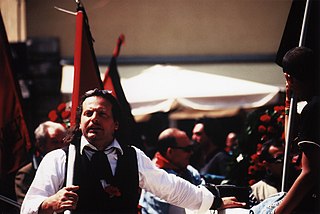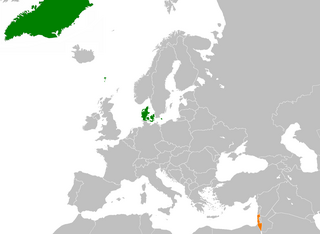Anarchist communism is a political ideology and anarchist school of thought that advocates communism. It calls for the abolition of private property but retention of personal property and collectively-owned items, goods, and services. It supports social ownership of property and the distribution of resources "From each according to his ability, to each according to his needs".

Freetown Christiania, also known as Christiania or simply Staden, is an intentional community and commune in the Christianshavn neighbourhood of the Danish capital city of Copenhagen. It began in 1971 as a squatted military base. Its Pusher Street is famous for its open trade of cannabis, which is illegal in Denmark.

The Zabalaza Anarchist Communist Front, formerly known as the Zabalaza Anarchist Communist Federation (ZabFed), is a platformist–especifista anarchist political organisation in South Africa, based primarily in Johannesburg. The word zabalaza means "struggle" or "active rebellion" in isiZulu, isiXhosa, siSwati and isiNdebele. Initially, as ZabFed, it was a federation of pre-existing collectives, mainly in Soweto and Johannesburg. It is now a unitary organisation based on individual applications for membership, describing itself as a "federation of individuals". Historically the majority of members have been people of colour. Initially the ZACF had sections in both South Africa and Swaziland. The two sections were split in 2007, but the Swazi group faltered in 2008. Currently the ZACF also recruits in Zimbabwe. Members have experienced oppression in South Africa and Swaziland.

Anarchism in Africa refers both to purported anarchic political organisation of some traditional African societies and to modern anarchist movements in Africa.

Sébastien Faure was a French anarchist, convicted sex offender, freethought and secularist activist and a principal proponent of synthesis anarchism.
Anarchism in the United States began in the mid-19th century and started to grow in influence as it entered the American labor movements, growing an anarcho-communist current as well as gaining notoriety for violent propaganda of the deed and campaigning for diverse social reforms in the early 20th century. By around the start of the 20th century, the heyday of individualist anarchism had passed and anarcho-communism and other social anarchist currents emerged as the dominant anarchist tendency.
Left-libertarianism, also known as left-wing libertarianism, is a political philosophy and type of libertarianism that stresses both individual freedom and social equality. Left-libertarianism represents several related yet distinct approaches to political and social theory. Its classical usage refers to anti-authoritarian varieties of left-wing politics such as anarchism, especially social anarchism.

Ungdomshuset is a social centre in Copenhagen, currently based at Dortheavej 61, Bispebjerg. Between 1982 and 2007, it was located at Jagtvej 69, Nørrebro. That building was originally named Folkets Hus, constructed by Copenhagen's labour movement in 1897.
Autonomism, also known as Autonomist Marxism, is an anti-capitalist social movement and Marxist-based theoretical current that first emerged in Italy in the 1960s from workerism. Later, post-Marxist and anarchist tendencies became significant after influence from the Situationists, the failure of Italian far-left movements in the 1970s, and the emergence of a number of important theorists including Antonio Negri, who had contributed to the 1969 founding of Potere Operaio as well as Mario Tronti, Paolo Virno and Franco "Bifo" Berardi.

Anarchism in France can trace its roots to thinker Pierre-Joseph Proudhon, who grew up during the Restoration and was the first self-described anarchist. French anarchists fought in the Spanish Civil War as volunteers in the International Brigades. According to journalist Brian Doherty, "The number of people who subscribed to the anarchist movement's many publications was in the tens of thousands in France alone."
Anarchism in Greece traces its roots to ancient Greece but was formed as a political movement during the 19th century. It was in the ancient era that the first libertarian thoughts appeared when philosophers based on rationality questioned the fundamentals of tradition. Modern anarchism in Greece emerged in the 19th century, heavily influenced by the contemporary European classical anarchism. Because of the Bolshevik success in the Russian Revolution of 1917 and the rise of the Communist Party, anarchism faded after the first decades of the 20th century. The collapse of the military junta put an end to the monopoly of the political power from the Right, whereas the dissolution of the Soviet Union diminished the allure of the Communist Party of Greece allowing anarchist groups to gain pace in Athens and other cities.

Martin Raahauge Borreskov Geertsen is a Danish politician, who is a member of the Folketing for the Venstre political party. He entered parliament in 2018 after Søren Pind resigned his seat. He was previously a member of parliament between 2011 and 2015. He is a former mayor of the Culture Committee in Copenhagen and former political leader of the Venstre party in Copenhagen.

General elections were held in Denmark on 15 September 2011 to elect the 179 members of the Folketing. Of those 179, 175 members were elected in Denmark, two in the Faroe Islands and two in Greenland.
Contemporary anarchism within the history of anarchism is the period of the anarchist movement continuing from the end of World War II and into the present. Since the last third of the 20th century, anarchists have been involved in anti-globalisation, peace, squatter and student protest movements. Anarchists have participated in armed revolutions such as in those that created the Makhnovshchina and Revolutionary Catalonia, and anarchist political organizations such as the International Workers' Association and the Industrial Workers of the World have existed since the 20th century. Within contemporary anarchism, the anti-capitalism of classical anarchism has remained prominent.

Denmark–Israel relations refers to the bilateral relationship between Denmark and Israel.

Magonism is an anarchist, or more precisely anarcho-communist, school of thought precursor of the Mexican Revolution of 1910. It is mainly based on the ideas of Ricardo Flores Magón, his brothers Enrique and Jesús, and also other collaborators of the Mexican newspaper Regeneración, as Práxedis Guerrero, Librado Rivera and Anselmo L. Figueroa.
Terrorism in Denmark refers to terrorist attacks carried out in Denmark or by people connected to Denmark. Like other countries Denmark increased its focus on defending against terrorist attacks after the September 11 attacks in New York in 2001. The September 11 attacks led to strengthened laws in a number of areas. 31 May 2002 the parliament of Denmark approved anti-terror legislation with the aim of preventing terrorism in Denmark and internationally. The new legislation aligned with the definitions of terrorism which were in use by the European Union and the United Nations.
Platformism is an anarchist organizational theory that aims to create a tightly-coordinated anarchist federation. Its main features include a common tactical line, a unified political policy and a commitment to collective responsibility.
A classless society is a society in which no one is born into a social class like in a class society. Distinctions of wealth, income, education, culture, or social network might arise and would only be determined by individual experience and achievement in such a society. Thus, the concept posits not the absence of a social hierarchy but the uninheritability of class status. Helen Codere defines social class as a segment of the community, the members of which show a common social position in a hierarchical ranking. Codere suggest that a true class-organized society is one in which the hierarchy of prestige and social status is divisible into groups. Each group with its own social, economic, attitudinal and cultural characteristics, and each having differential degrees of power in community decision.
Anarchism in Denmark emerged in the late 19th century from the revolutionary factions of early social democratic spheres, crystalizing into a widespread anarcho-syndicalist movement that reached its height during the late 1910s. After the disintegration of organized syndicalism, anarchists in post-war Denmark began to organize the squatters' movement, which led to the creation of Freetown Christiania.











